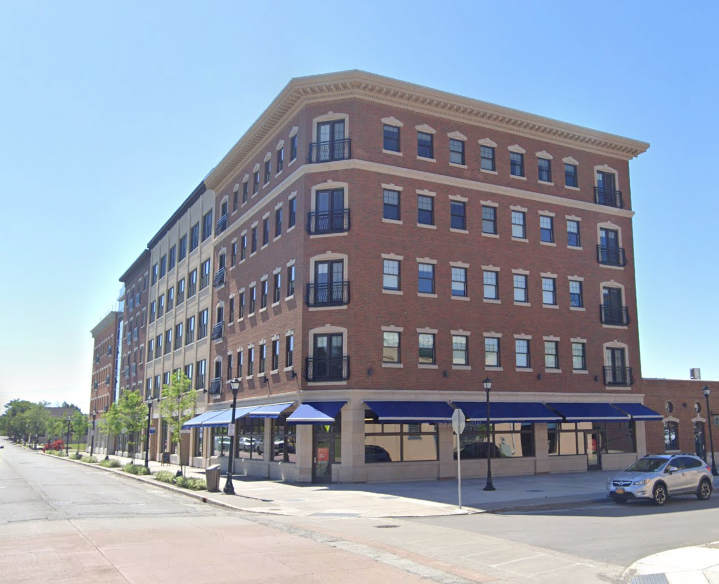A recent NPR news story focused on how the city of Austin, TX has become the most recent large city to eliminate its minimum parking requirements, joining an increasing number of cities and states in doing so. This has once again touched off discussion of what to do about St. Louis’ parking requirements on various corners of social media. In light of this, I wanted to focus on the effects that several cities that were far earlier in eliminating parking mandates have seen, and highlight how these would be beneficial to several local projects. In particular, I want to focus on the experiences of Buffalo, NY as it relates to historic preservation, and Minneapolis, MN as it relates to affordable housing in order to show why St. Louis should join the trend.
Prior to 2016, Minneapolis was beginning to develop a housing affordability problem. According to the Bipartisan Policy Center(1), it added 37,000 new residents, but only added 12,000 new housing units, with 15,000 affordable housing units being lost. In 2015, the city council attempted to address this by dramatically reducing parking requirements near high-frequency public transit (every 15 minutes or less). Since then, the rate of multi-family housing unit permits has more than doubled, leading to Minneapolis’ city council unanimously abolishing all parking requirements citywide in 2021. The reason for this success has been pointed out by scholars like Donald Shoup for years: free parking isn’t actually free. A space in a covered garage can cost around $27,000 and up for when anything beyond the basics are included ($28,263 in St. Louis in 2022) (2) to actually build, and by eliminating the requirement for them, developers managed to deliver new-build apartments for almost 20% less (3). This lowered the incentive to renovate affordable units, and has contributed to rents in Minneapolis rising by only 1% between 2017 and 2023 (4). Now, legislation has been introduced in the Minnesota state legislature to eliminate all parking minima statewide.
The benefits of parking reform don’t stop there, as evidenced by Buffalo’s experience with parking reform. Like St. Louis, Buffalo, NY is a now car-oriented Rust Belt city with a declining population. However, in 2017, they became the first relatively large city to eliminate the minimum off-street parking requirements for all new development citywide. In the years since, 68%(5) of all new homes within city limits have used parking ratios that would not have been allowed previously. In particular, this has made it easier for people to renovate historic structures that predated parking requirements in the first place, as the high fixed costs can now be spread among more tenants. An article on the Strong Towns website called “The Magic of Legacy Shops Comes Back To Life In Buffalo”(6) gives numerous examples of buildings brought back to use because they no longer had to worry about providing parking or getting an onerous use variance.
I would like to point out how a reduction in parking requirements could affect several local projects. ARCO construction is currently building the Vande East apartment tower at City Foundry, which includes 270 units perched above 481 parking spaces. Assuming the $27,000 figure is correct, the parking pedestal is costing them around $13,000,000, plus whatever it increases construction costs by to build an apartment building 6 stories above ground. Even halving the size of that pedestal would realize significant cost savings (perhaps as much as 20% of the cost of the whole project) for them that could be passed on to potential renters. Meanwhile, the conversion of the shuttered Fanning Middle School into an apartment complex with an affordable housing component is currently being stalled by employees of Beyond Housing over minimum parking requirements (a position that Minneapolis’ experience shows to be preposterous). A reduction or elimination of the requirements would deny these NIMBYs one vehicle with which to object.
As Buffalo and Minneapolis clearly demonstrate, removing parking requirements makes it easier to add new development in places it is currently prohibited, and helps keep rates for existing housing lower. St. Louis should emphatically join the ranks of cities across the US in eliminating its parking requirements citywide.
- Comprehensive Zoning Reform in Minneapolis, MN
- WGI Consulting’s Parking Structure Cost Outlook
- What Happens When You Ease Parking Requirements for New Housing
- Yahoo – Only One American City Has Fought Inflation and Won – 2 Simple Ways It Keeps Costs Low
- Parking reform legalized most of the new homes in Buffalo and Seattle
- Strong Towns – The Magic of Legacy Shops Comes Back to Life in Buffalo

